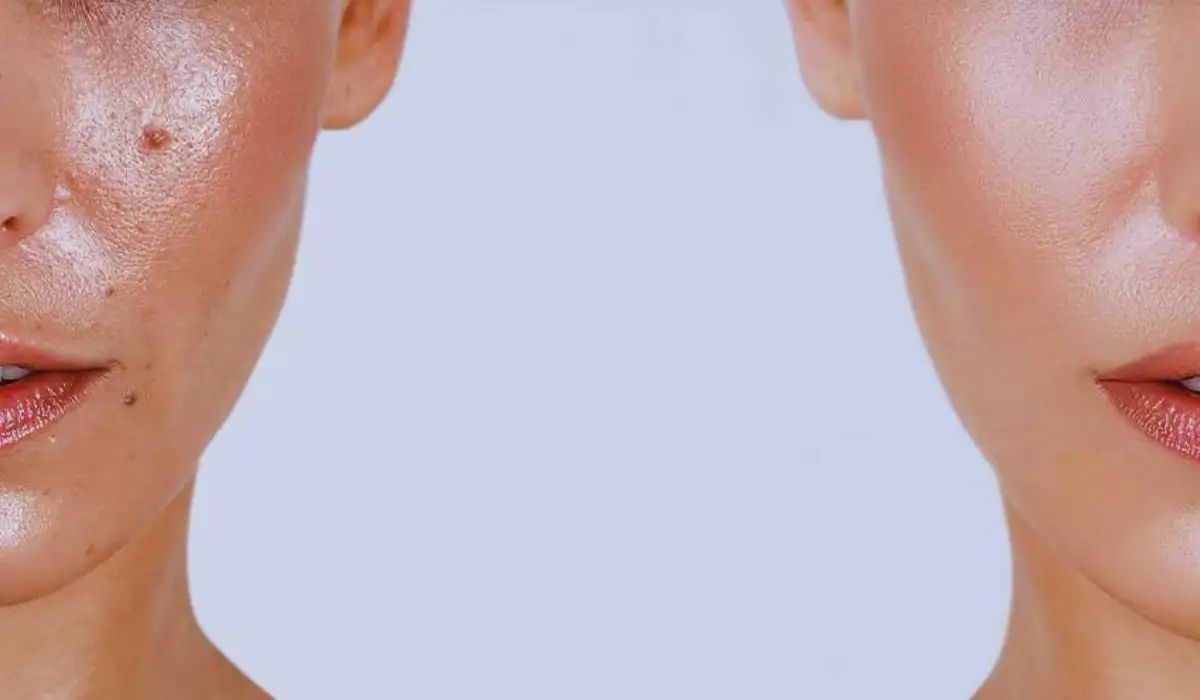With its uninvited glossy sheen, oily skin can be a daily skincare struggle. This skin type, prone to enlarged pores and blackheads, demands special attention. However, the journey to manage oily skin is still possible.
You can control excess oil with the right knowledge, products, and a hint of humor. This article simplifies the complexities of oily skin care.
It offers effective and practical tips for a healthy, balanced skincare routine. Let’s embark on this journey together towards achieving a comfortable, oil-free glow.
What is Oily Skin?

Oily skin happens when your glands make too much sebum, waxy, oily substance. Sebum is meant to keep your skin moist and safe. But when it is too much, your skin can look greasy, and you might get more pimples and acne.
Causes of Oily Skin
Oily skin can happen for many reasons. Some reasons we can’t change, and some we can. One reason for oily skin is genetics.
Other causes include
- Hormonal changes from puberty, pregnancy, or menopause.
- Some medicines, especially those changing hormone levels.Health conditions like PCOS in women.
A study showed women in China who were heavier and ate more dairy or sweets often had oilier skin.
How To Care For Oily Skin
Cleansing
Cleansing is foundational in managing oily skin. Choose a gentle, oil-free cleanser to eliminate excess oil without removing necessary moisture. Harsh cleansers can provoke your skin into an oil-producing frenzy.
Cleanse your face twice daily to maintain clear pores and prevent buildup. Do it once in the morning and once at night. Each day, you must set a clean, balanced base for your skin. This prepares it for the next steps in your skincare routine.
Exfoliation
Exfoliation is critical in removing dead skin cells and controlling excess oil. But remember, moderation is key. Overdoing it can lead to irritation and increased oil production.
Choose gentle exfoliants and limit the practice to 2-3 times weekly. This approach helps unclog pores and smooth your skin without being too harsh. It’s like giving your skin a gentle nudge, rather than an aggressive push, to renew itself.
Moisturizing
It’s a common misconception that oily skin doesn’t need moisturization. Skipping this step can signal your skin to produce even more oil. Opt for a light, non-comedogenic moisturizer that hydrates without adding oiliness.
This step is about reassuring your skin that it has sufficient moisture, reducing the need to produce excess oil. A daily moisturizer can help maintain a balance. It ensures your skin stays hydrated and comfortable.
Sun Protection
Sunscreen is vital for all skin types, including oily skin. Sun exposure can exacerbate oil production and lead to more significant skin problems.
Use a broad-spectrum, oil-free sunscreen daily to protect your skin without adding greasiness. This habit is crucial for maintaining skin health and preventing long-term damage.
Masks and Treatments
Incorporate weekly treatments like masks to manage oily skin further. Clay masks are particularly effective as they absorb excess oil and impurities. However, use them sparingly to avoid over-drying your skin.
Other treatments, like serums with niacinamide, can help regulate oil production. They can also improve skin texture. These weekly rituals can complement your daily routine. They offer targeted care for specific issues associated with oily skin.
Home Remedies For Oily Skin
Oatmeal
Oatmeal is good for calming red and oily skin and removing dead skin. When used for face masks, it’s usually in a ground form. Mix it with yogurt, honey, or mashed fruits like bananas, apples, or papaya.
Here’s how to use it: Make a paste by mixing ½ cup of ground oatmeal with hot water. Add one tablespoon of honey to it.
Rub this mixture on your face for three minutes, then rinse with warm water and gently dry your face. Put the oatmeal mix on your face and wait 10–15 minutes before rinsing and drying.
Aloe Vera
Aloe vera is a plant with properties that can kill germs, reduce inflammation, and help heal wounds. Here’s how to use aloe vera for oily skin: First, cut a few leaves from near the stem of a mature aloe plant. Take off the sharp edges with a knife, then wash and dry the leaves.
To get the gel out, slice the top layer of a leaf with a sharp knife. You’ll see the gel inside. Scrap it out with a spoon or knife. You can cut the gel into pieces or blend it.
To use the gel on your face, put a thin layer on it, and you can leave it on overnight.
Be careful if you have infected skin, as aloe vera might not be good for you. It can also cause allergies. Try putting some gel on your forearm first. 48 hours, it should be safe to use on your face.
Skin Whites
Egg whites are sometimes used for oily skin, but there’s no proof they tighten pores. To make an egg white mask, you need one egg white. Mix it with lemon juice. Stir until it gets thick.
Put it on your face for 15 minutes. Then, wash your face with warm water to take off the mask. Dry your face gently.
Fuller’s Earth
Fullern’s Earth, or Multani Mitti, is great for oily skin. It soaks up oil and dirt, leaving your skin fresh and bright. You can make different face packs with it.
Mix turmeric, sandalwood powder, gram flour, and saffron for a herbal pack. Add water to make a paste. Use this mask to help with oily skin.
Diet and Lifestyle
What you eat and how you live affect how much oil your skin makes. Drinking water and eating fruits, vegetables, and lean meats can help control your skin‘s oil.
What you put on your skin and what you eat are important. Eating healthy helps your skin and reduces oily skin problems. Your diet and drinking water are key to taking care of your skin. They help other skin treatments work better.
Manage Stress
Stress can make your skin oilier. Doing things like exercise, meditation, or hobbies can help. Exercise makes blood flow better and can balance your hormones.
This can make your skin less oily. Relaxing and being mindful can reduce stress hormones. This is good for your skin. If you manage stress, you can help your oily skin. This looks at both inside and outside causes.
Conclusion
Manage oily skin by practicing proper skincare habits and making sensible lifestyle decisions. It may be a bit challenging, but it’s hardly impossible. Each stage is essential in oil control.
This includes using suitable cleansers and moisturizers, applying sunscreen, and using masks. Some home remedies that can be considered for this common problem include oatmeal, aloe vera, egg whites, and Fuller’s Earth. But it’s not only about topical treatments.
Your diet, hydration, and stress management are equally vital. You can manage oily skin effectively by addressing external care and inner health.
This can help you achieve a more balanced complexion. Consistency and knowing your skin’s unique needs are the keys to success. With patience and the right method, that oil-free glow can be attained.

